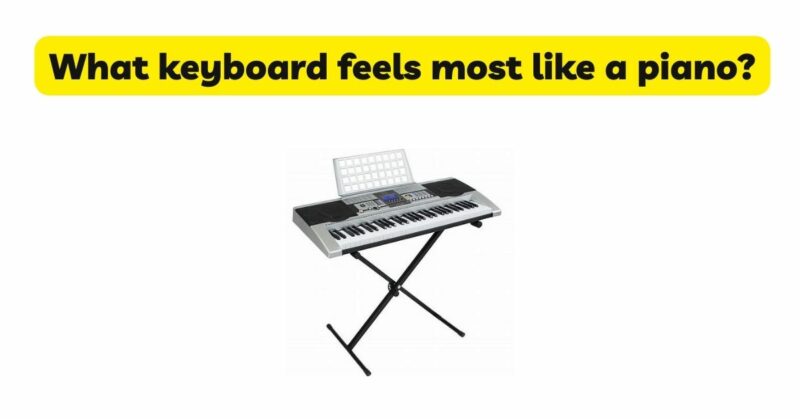For pianists seeking the versatility and convenience of a keyboard, finding an instrument that closely replicates the feel of an acoustic piano is paramount. The touch and responsiveness of the keys play a crucial role in recreating the piano experience. In this article, we delve into the factors that contribute to a keyboard feeling like a piano, including key considerations such as keyboard types, key action, touch sensitivity, weight, and response. By examining these factors, we aim to provide insights into the keyboards that offer the closest approximation to the piano-playing experience and help readers make an informed decision that aligns with their musical preferences and goals.
- Weighted Keyboards with Hammer Action: Weighted keyboards with hammer action are widely regarded as the closest approximation to the feel of an acoustic piano. These keyboards replicate the mechanism of an acoustic piano, with each key having a weight and a hammer that mimics the feel of striking the strings. The resistance and response of the keys closely resemble the touch sensitivity of an acoustic piano, providing a more authentic playing experience.
- Graded Hammer Action: Graded hammer action takes the emulation of a piano’s feel a step further. In addition to weighted keys, graded hammer action keyboards provide a progressively heavier touch as you move up the keyboard, replicating the difference in key response found in a traditional piano. This feature allows pianists to feel the natural progression of weight and touch sensitivity, enhancing their ability to express dynamics and nuances in their playing.
- Key Action and Touch Sensitivity: The key action and touch sensitivity of a keyboard contribute significantly to its piano-like feel. Keyboards with responsive key action ensure that the keys react accurately to the player’s touch, allowing for subtle variations in dynamics and expressive playing. Touch-sensitive keys enable the player to control the volume and tone of the notes by varying the intensity of their touch, further enhancing the piano-playing experience.
- Weight and Response: The weight and response of the keys are crucial in replicating the feel of an acoustic piano. Keyboards with keys that have a good amount of resistance and a natural rebound mimic the touch of a piano. The keys should provide a solid and stable feel, allowing the player to articulate and control the sound with precision.
- Sound Quality and Sampling: While the focus is on replicating the feel of a piano, the quality of the piano sound produced by the keyboard is also essential. High-quality sound sampling technology, capturing the nuances of acoustic pianos, ensures that the keyboard delivers a realistic and authentic piano tone. The depth, richness, and expressiveness of the piano sound contribute to the overall piano-like experience.
- Brand Reputation and Customer Reviews: Considering the brand reputation and reading customer reviews can provide insights into the reliability, build quality, and customer satisfaction of a keyboard. Well-established brands with a history of producing high-quality instruments are often a safe choice. It is important to evaluate each model individually, taking into account specific features, overall build quality, and value for money.
Conclusion: When searching for a keyboard that feels most like a piano, it is important to consider factors such as weighted keyboards with hammer action, graded hammer action, key action, touch sensitivity, weight, response, sound quality, and brand reputation. Weighted keyboards with hammer action closely replicate the feel of an acoustic piano, while graded hammer action further enhances the realism by simulating the varying touch sensitivity across the keyboard. Keyboards with responsive key action, touch-sensitive keys, and a good amount of weight and response contribute to the piano-like feel. Additionally, high-quality sound sampling technology ensures the keyboard produces authentic and expressive piano tones. Evaluating brand reputation and reading customer reviews provides valuable insights into reliability and customer satisfaction. By carefully considering these factors, pianists can find a keyboard that brings them closer to the nuanced and expressive experience of playing a traditional piano, supporting their musical journey and artistic expression.


